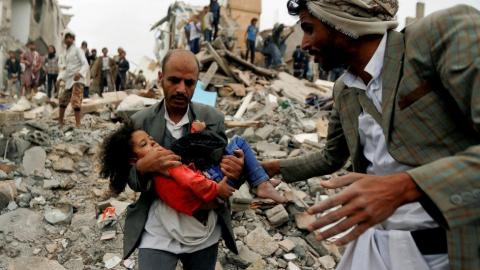Yemen war: Four civilians killed or wounded every day since peace deal


Four civilians have been killed or injured every day in two of Yemen’s worst-hit areas since a peace deal was agreed two years ago, Oxfam has said, warning that violence is growing across the country.
Yemen’s internationally recognised government and the Iran-backed Houthi rebel group signed the Stockholm Agreement on 13 December 2018 to halt hostilities around the Red Sea port city of Hodeidah and to address the mounting humanitarian crisis in the central province of Taiz.
It marked the first time in years that the warring sides had met and was supposed to lay the groundwork for a comprehensive long-term peace deal to end the devastating conflict, now in its fifth year.
Since then, however, 592 civilians have been killed and 2,136 wounded in the two areas, according to data compiled by the Civilian Impact Monitoring Project and analysed by Oxfam, meaning that, on average, approximately four civilians a day have been killed or injured.
The global aid organisation said that rather than these agreements bringing an end to violence in Yemen, attacks on civilians were on the rise. It urged the international community to intervene and halt the sale of weapons for use in the war. According to the Campaign Against Arms Trade, the UK has given £1bn in aid to Yemen but has licensed £6.5bn worth of arms to countries bombing it.
Mohamed, a 50-year-old widower, fled Taiz City in early November when his daughter’s husband was killed. The father of four is now living in a school, ten people to a tent, and fears he will be evicted.
“They want us to leave because it’s overcrowded. [But] there’s nowhere else for us to go,” he told Oxfam.
Hannah Cooper, Oxfam’s Humanitarian Policy and Advocacy Adviser in Yemen said: “Every day, civilians are dying or being injured in this senseless conflict, while also facing hunger and disease in what is the world’s biggest humanitarian crisis.
“Members of the international community, including the UK, need to stop fuelling the conflict by selling weapons for use in the war.
“Instead they should do all they can to get the warring parties to agree to a nationwide ceasefire that would build confidence and see all parties return to negotiations committed to achieving a lasting peace.”
Yemen has been ripped apart by a devastating civil war since the Iran-backed Houthi rebels seized control of the country in late 2014, ousting the recognised president.
Saudi Arabia and its gulf allies launched a bombing campaign in March 2015 to reinstate the government, hoping for a speedy resolution to the crisis.
Five years on, the conflict still rages and more recently has sparked a war within a war as southern separatists, nominally allied to the government, turned on their former allies to fight for an independent south.
Over the last few months, fighting has escalated in Hodeidah and Taiz, with civilians saying they have been forced to flee to squalid displacement camps despite the winter conditions and the pandemic.
Jamila, 50, left Taiz City in search of safety and, like Mohamed, is also currently living in a classroom. She is struggling with breast cancer but has no access to healthcare.
“The local community wants us to leave – they want their school back. We can understand that, but we have no other place to go,” she said.
“My husband and I have to beg for help. We’re already having trouble affording the medicine that I need. I’ve sold my jewellery to buy that. We often go for days eating only bread and water so that we can afford our medicines.”

Aden — Yemen Airways has announced new updates to its ticket cancellation (VOID) policy, introducing financial penalties on travel agents in…

Geneva – The United States announced that Yemen will not be among the countries benefiting from a new $2 billion funding pledge for United Na…

Paris — The French humanitarian organization Acted announced that it has delivered cash assistance to nearly 89,000 people affected by displa…